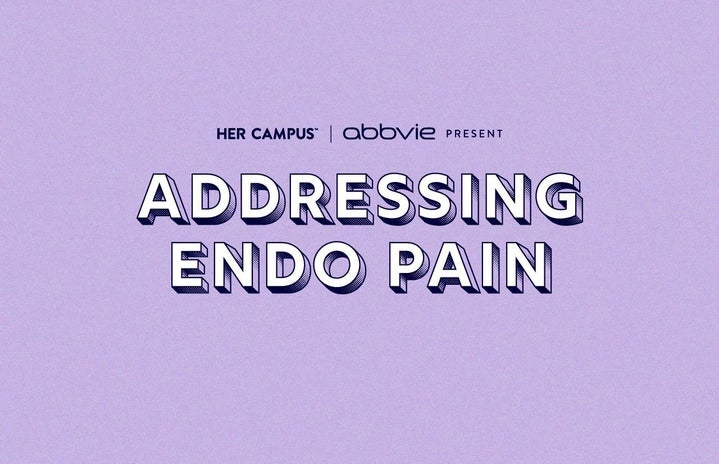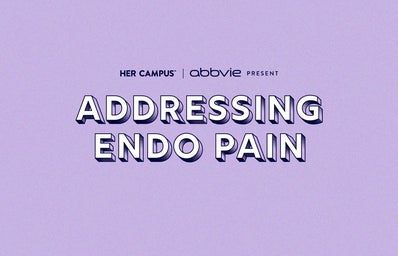This is a sponsored feature. All opinions are 100% from Her Campus.
Real talk: Getting your period isn’t fun, especially when it means bloating and hormonal mood swings. While those symptoms are usually normal (unfortunately), experiencing severe pelvic pain during your period could be a sign of something more serious, like endometriosis. You might have heard of the condition, but what is it exactly? In simplest terms, endometriosis is a chronic disease that occurs when tissue similar to the lining of your uterus, called the endometrium, starts growing outside of your uterus (yeah, it doesn’t belong there) and forms growths that are called lesions. This can cause a range of symptoms that can impact your daily activities, from painful periods to pelvic pain between periods, and pain during sex.
While there is no cure for endometriosis, treatment options are available. It’s important to take an active role in your health and speak up about any symptoms you are experiencing with your doctor to help determine if you might have endometriosis and, if you are diagnosed, make sure they understand your individual needs to develop a treatment plan that is right for you. Treatment options for endometriosis pain you discuss could include ORILISSA® (elagolix)—a prescription medication made for women 18-years-old and over with moderate to severe endometriosis pain – and resources, like the patient program Ori for Me®.
ORILISSA may not be for everyone. Do not use ORILISSA if you are or may be pregnant, have osteoporosis, severe liver disease, or take medicines such as cyclosporine or gemfibrozil. Please see below for additional Important Safety Information. Please click here for Full Prescribing Information and Medication Guide.
A pill made for moderate to severe endo pain
ORILISSA is a pill developed for women 18-years-old and over who experience moderate to severe endometriosis pain. It has been proven to help relieve three common symptoms: painful periods, pelvic pain in between periods, and pain with sex*. It works by lowering the amount of estrogen in the body. Less estrogen is less fuel for painful endometriosis lesions. ORILISSA is available in two doses. Each dose dials estrogen down to a different level. Your doctor can determine the correct dose for you based on your symptoms and treatment goals. You didn’t choose to have endometriosis, but you can choose to take an active role in your health by talking with your doctor about treatment options and learning if ORILISSAmay be right for you.
*There are two different doses of ORILISSA: 150 mg (taken once a day) or 200 mg (taken twice a day). Only the 200 mg dose was proven to work for pain with sex.
ORILISSA does not prevent pregnancy. It may alter your period, so watch for other signs of pregnancy. Stop taking ORILISSA if you become pregnant. Ask about proper birth control, as some may affect how ORILISSA works. ORILISSA can cause serious side effects including bone loss, abnormal liver tests, suicidal thoughts or behaviors, and worsening mood. Talk to your healthcare provider right away if you notice changes such as jaundice, dark amber-colored urine, suicidal thoughts or actions, depression, or worsening mood.
Prepare for your doctor’s visit with a discussion guide
Talking about your endo pain isn’t always easy. To help your conversation go smoothly, you can create a personalized discussion guide on ORILISSA.com to help you explain your endometriosis pain to your gynecologist. It’s a handy tool to assist you with your discussion about the symptoms you are experiencing, and to help determine if asking your doctor about ORILISSA may be the right next step for you.
Track your endo pain with an app that is uniquely yours
The Ori for Me App gives you personalized support right from the start, to help you track your endometriosis pain and wellness. With the app you can get access to tips and life hacks for women living with endometriosis. Tracking your wellness is important too, so you can also log your stress, sleep, and water intake with the app’s wellness tracker.
If you have any questions about ORILISSA, you can also chat one-on-one with a support nurse directly through the app. Of course, you should always remember to talk to your doctor for medical guidance. Ori For Me nurses do not offer medical advice.
Get access to educational videos and patient testimonials
Curious about other women’s experiences with ORILISSA? You can learn more about their individual endometriosis journeys, how it led them to try ORILISSA, and their personal treatment experiences.
USE
ORILISSA® (elagolix) is a prescription medicine used to treat moderate to severe pain associated with endometriosis. It is not known if ORILISSA is safe and effective in children under 18 years of age.
IMPORTANT SAFETY INFORMATION
What is the most important information I should know about ORILISSA? ORILISSA may cause serious side effects, including:
Bone Loss (decreased Bone Mineral Density [BMD])
- While you are taking ORILISSA, your estrogen levels will be low. This can lead to BMD loss. Your BMD may improve after stopping ORILISSA, but may not recover completely. It is unknown if these bone changes could increase your risk for broken bones as you age. Your healthcare provider (HCP) may order a DXA scan to check your BMD.
Effects on Pregnancy
- Do not take ORILISSA if you are trying to become or are pregnant, as your risk for early pregnancy loss may increase. If you think you are pregnant, stop taking ORILISSA right away and call your HCP. ORILISSA may change your menstrual periods (irregular bleeding or spotting, a decrease in menstrual bleeding, or no bleeding at all), making it hard to know if you are pregnant. Watch for other signs of pregnancy, such as breast tenderness, weight gain, and nausea. ORILISSA does not prevent pregnancy.
- You will need to use effective hormone-free birth control (such as condoms or spermicide) while taking ORILISSAand for one week after stopping ORILISSA. Birth control pills that contain estrogen may make ORILISSA less effective. It is unknown how well ORILISSA works while on progestin-only birth control.
Do not take ORILISSA if you:
- Are or may be pregnant, have osteoporosis, have severe liver disease, or take medicines known as strong OATP1B1inhibitors, such as cyclosporine or gemfibrozil. If you are unsure if you are taking one of these medicines, ask your HCP.
What should I tell my HCP before taking ORILISSA? Tell your HCP about all of your medical conditions, including if you:
- Have or have had broken bones, have other conditions, or take medicines that may cause bone problems; have or have had depression, mood problems, or suicidal thoughts or behavior; have liver problems; think you may be pregnant; or are breastfeeding or plan to be. It is unknown if ORILISSA passes into breast milk. Talk to your HCP about the best way to feed your baby if you take ORILISSA.
Tell your HCP about all of the medicines you take, including prescription and over-the-counter medicines, vitamins, and herbal supplements.
Especially tell your HCP if you take birth control pills. Your HCP may advise you to change the pills you take or your method of birth control.
What are the possible side effects of ORILISSA?
ORILISSA can cause serious side effects including:
- Suicidal thoughts, actions, or behavior, and worsening of mood. Call your HCP right away, or call 911 if an emergency, if you have any of these symptoms, especially if they are new, worse, or bother you: thoughts about suicide or dying, try to commit suicide, new or worse depression or anxiety, or other unusual changes in behavior or mood. You or your caregiver should pay attention to any changes, especially sudden changes in your mood, behaviors, thoughts, or feelings.
- Abnormal liver tests. Call your HCP right away if you have any of these signs and symptoms of liver problems: yellowing of the skin or the whites of the eyes (jaundice), dark amber-colored urine, feeling tired, nausea and vomiting, generalized swelling, right upper stomach area pain, or bruising easily.
The most common side effects of ORILISSA include: hot flashes or night sweats, headache, nausea, difficulty sleeping, absence of periods, anxiety, joint pain, depression, and mood changes. These are not all of the possible side effects of ORILISSA. This is the most important information to know about ORILISSA. For more information, talk to your doctor or HCP.
Take ORILISSA exactly as your HCP tells you. Tell your HCP if you have any side effect that bothers you or that does not go away. Call your HCP for medical advice about side effects.
You are encouraged to report negative side effects of prescription drugs to the FDA. Visit www.fda.gov/medwatch or call 1-800-FDA-1088.
If you are having difficulty paying for your medicine, AbbVie may be able to help. Visit AbbVie.com/myAbbVieAssist to learn more.
Please click for Full Prescribing Information and Medication Guide for Patients.


